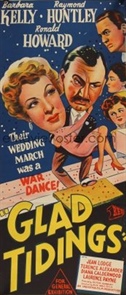Glad Tidings (film)
| Glad Tidings | |
|---|---|
 | |
| Directed by | Wolf Rilla |
| Written by | Wolf Rilla |
| Based on | play by R. F. Delderfield |
| Produced by | Victor Hanbury John Bremer executive: Nat Cohen Stuart Levy |
| Starring | Barbara Kelly Raymond Huntley Ronald Howard Jean Lodge |
| Cinematography | Eric Cross |
| Edited by | Peter Seabourne |
| Music by | Wolf Rilla |
Production company | |
| Distributed by | Eros Films (UK) |
Release date |
|
Running time | 67 minutes |
| Country | United Kingdom |
| Language | English |
Glad Tidings is a 1953 British second feature ('B')[1] comedy film directed by Wolf Rilla and starring Barbara Kelly, Raymond Huntley and Ronald Howard.[2][3] It was written by Rilla based on the play of the same title by R. F. Delderfield.
Plot
[edit]A retired RAF officer returns home to his sleepy little rural community with an attractive new American fiancée, to the initial resentment of his children.
Cast
[edit]- Barbara Kelly as Kay Stuart
- Raymond Huntley as Tom Forester
- Ronald Howard as Corporal Nicholas Brayne
- Jean Lodge as Celia Forester
- Terence Alexander as Flight Lieutenant Spud Cusack
- Diana Calderwood as Josephine Forester
- Laurence Payne as Clive Askham
- Arthur Howard as Mr. Boddington
- Brian Smith as Derek Forester
- Yvette Wyatt as Miggs Forester
- Doris Yorke as Mrs. Boddington
- Stella Richman as Anna
- Harry Green as the golfer
- John Warren as club barman
- Louis Matto as waiter
- Peter Forbes-Robertson as reception clerk
Production
[edit]The film was made at Nettlefold Studios, Walton-on-Thames, England, and on location. Art direction was by John Stoll.[3]
Critical reception
[edit]The Monthly Film Bulletin wrote: "A slow moving and not very amusing screen version of R. F. Delderfield's domestic comedy. The playing on the whole is adequate, and Raymond Huntley, as usual, gives a polished performance."[4]
Kine Weekly wrote: "The picture, which depends more on situation and dialogue than action for its fun, is smoothly portrayed by Barbara Kelly, Raymond Huntley, Ronald Howard and a host of sound supporting players, and their sure timing more than atones for its lack of movement. Jolly and sentimentally refreshing, it makes its point without wearing out shoe leather."[5]
Picturegoer wrote: "Entertaining enough in parts, but so theatrical that you can almost hear the rattle of matinée teacups."[6]
Picture Show called the film "an amusing light comedy."[7]
TV Guide wrote: "Plodding domestic trifle."[8]
Sky Cinema said that the film provided "Raymond Huntley and Barbara Kelly (Bernard Braden's wife) with rare leading roles in a feature film. Huntley gets a chance to break away from his stuffy bureaucrats and he's a pleasure to watch."[9]
References
[edit]- ^ Chibnall, Steve; McFarlane, Brian (2009). The British 'B' Film. London: BFI/Bloomsbury. p. 99. ISBN 978-1-8445-7319-6.
- ^ "Glad Tidings". British Film Institute Collections Search. Retrieved 24 December 2024.
- ^ a b "Glad Tidings! (1953)". British Film Institute. Archived from the original on 9 March 2016.
- ^ "Glad Tidings". The Monthly Film Bulletin. 20 (228): 149. 1 January 1953 – via ProQuest.
- ^ "Glad Tidings". Kine Weekly. 437 (2407): 14. 13 August 1953 – via ProQuest.
- ^ "Glad Tidings". Picturegoer. 26: 21. 2 October 1953 – via ProQuest.
- ^ "Glad Tidings". Picture Show. 61 (1592): 10. 3 October 1953 – via ProQuest.
- ^ "Glad Tidings". TVGuide.com.
- ^ "Glad Tidings". Sky Cinema. Archived from the original on 1 September 2017.
External links
[edit]- Glad Tidings at IMDb
- Glad Tidings at BFI
- 1953 films
- British comedy films
- British black-and-white films
- 1953 comedy films
- Films directed by Wolf Rilla
- Films shot at Nettlefold Studios
- British films based on plays
- Films shot in England
- Films set in England
- Films set in London
- 1950s English-language films
- 1950s British films
- English-language comedy films
